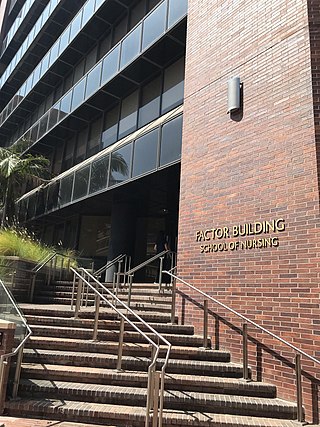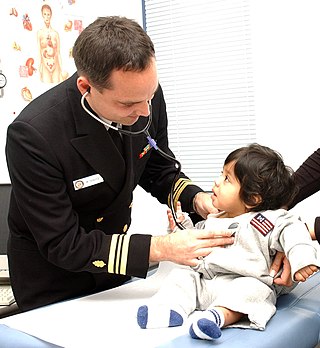
A registered nurse (RN) is a nurse who has graduated or successfully passed a nursing program from a recognized nursing school and met the requirements outlined by a country, state, province or similar government-authorized licensing body to obtain a nursing license. An RN's scope of practice is determined by legislation, and is regulated by a professional body or council.
The Bachelor of Science in Nursing also known in some countries as a Bachelor of Nursing (BN) or Bachelor of Science (BS) with a Major in Nursing is an academic degree in the science and principles of nursing, granted by an accredited tertiary education provider. The course of study is typically three or four years. The difference in degree designation may relate to the amount of basic science courses required as part of the degree, with BScN and BSN degree curriculums requiring completion of more courses on math and natural sciences that are more typical of BSc degrees and BN curriculums more focused on nursing theory, nursing process, and teaching versions of general science topics that are adapted to be more specific and relevant to nursing practice. Nursing school students are generally required to take courses in social and behavioral sciences and liberal arts, including nutrition, anatomy, chemistry, mathematics, and English. In addition to those courses, experience in physical and social sciences, communication, leadership, and critical thinking is required for a bachelor's degree. BSN programs typically last 2–4 years. Someone who holds a BSN can work in private or public medical and surgical hospitals, physician's offices, home health care services, and nursing facilities. Having a BSN can result in more opportunities and better salary than just an associate degree.
Nurse education consists of the theoretical and practical training provided to nurses with the purpose to prepare them for their duties as nursing care professionals. This education is provided to student nurses by experienced nurses and other medical professionals who have qualified or experienced for educational tasks, traditionally in a type of professional school known as a nursing school. Most countries offer nurse education courses that can be relevant to general nursing or to specialized areas including mental health nursing, pediatric nursing and post-operatory nursing. Courses leading to autonomous registration as a nurse typically last four years. Nurse education also provides post-qualification courses in specialist subjects within nursing.
An Associate of Science in Nursing (ASN) is a tertiary education nursing degree which typically takes 2–3 years to complete. In the United States, this type of degree is usually awarded by community colleges or similar nursing schools. Some four-year colleges also offer this degree. Students awarded an Associate of Science in Nursing are qualified to sit for the NCLEX-RN and apply for licensure as a Registered Nurse.

Nurses in the United States practice nursing in a wide variety of specialties and departments.
The University of Virginia School of Nursing, established in 1901, is a school of nursing education. It has an enrollment of approximately 800 students, and is consistently rated in the top 4% of U.S. nursing schools. After the retirement of Dorrie K. Fontaine as the fifth dean of the School, two-term American Nurses Association President Pam Cipriano, a research faculty member at UVA for years, stepped in as interim dean in August 2019.
In the United States, a psychiatric-mental health nurse practitioner (PMHNP) is an advanced practice registered nurse trained to provide a wide range of mental health services to patients and families in a variety of settings. PMHNPs diagnose, conduct therapy, and prescribe medications for patients who have psychiatric disorders, medical organic brain disorders or substance abuse problems. They are licensed to provide emergency psychiatric services, psychosocial and physical assessment of their patients, treatment plans, and manage patient care. They may also serve as consultants or as educators for families and staff. The PMHNP has a focus on psychiatric diagnosis, including the differential diagnosis of medical disorders with psychiatric symptoms, and on medication treatment for psychiatric disorders.

The UCLA School of Nursing is a nursing school affiliated with UCLA, and is located in the Westwood neighborhood of Los Angeles, California. The school is housed in the Doris and Louis Factor Health Sciences Building, known as the Factor Building, on the south end of UCLA's 400-plus-acre campus, adjacent to the Ronald Reagan UCLA Medical Center.
The School of Nursing at Duquesne University in Pittsburgh, Pennsylvania is one of ten degree-granting bodies which make up the university. The program currently has 565 undergraduate and 282 graduate students.

American Sentinel University was a private for-profit online university focused on nursing education and headquartered in Denver Colorado. It was regionally accredited by the Higher Learning Commission and nationally accredited by the Distance Education Accrediting Commission prior to its acquisition by Post University in March 2021. Now it is known as the American Sentinel College of Nursing and Health Sciences at Post University and accredited by the New England Commission of Higher Education.

A family nurse practitioner (FNP) provides continuing and comprehensive healthcare for the individual and family across all ages, genders, diseases, and body systems. Primary care emphasizes the holistic nature of health and it is based on knowledge of the patient in the context of the family and the community, emphasizing disease prevention and health promotion.

American College of Education (ACE) is a private for-profit online college based in Indianapolis, Indiana, focused on education, healthcare, nursing, and business. American College of Education is a certified B Corporation and a subsidiary of ACE Holdco PBC of Dallas, Texas.
The University of Central Florida College of Nursing is an academic college of the University of Central Florida located in Orlando, Florida, United States. The dean of the college is Mary Lou Sole, PhD, RN, CCNS, CNL, FAAN, FCCM.

Galen College of Nursing is a private nursing school with multiple locations in the United States.
The Hunter-Bellevue School of Nursing (HBSON) is the nursing school of Hunter College, a public university that is a constituent organization of the City University of New York (CUNY). It is located on the Brookdale Campus, at East 25th Street and 1st Avenue in Kips Bay, near Bellevue Hospital. The school is the flagship nursing program for CUNY.

Jersey College is a private for-profit career college specializing in nursing education with its main campus in Teterboro, New Jersey. The college was established in 2003 and started its first class in 2004. Jersey College has sixteen other locations in Arizona, Florida, Indiana, New Jersey, Pennsylvania, and Tennessee.
Advanced practice registered nurses (APRNs) are registered nurses with graduate degrees in nursing. APRN roles include: certified nurse midwife, clinical nurse specialist, certified registered nurse anesthetist, and nurse practitioner. APRNs assess, diagnose, manage patient medical problems, order diagnostic tests, and prescribe medications. Rules, regulations, and credentialing for APRNs vary by state. This page outlines the regulatory processes for nurse practitioners in Wisconsin, including education, certification, licensing, and credentialing. Regulatory and credentialing processes are continuously changing, and the information contained on this page is current as of November 2015.
Nursing is the largest healthcare profession in the United States, with more than 3.1 million registered nurses. Between 2012 and 2022, employment for nurses is projected to grow by 19 percent, which is more than any other profession. Nurses make up the largest component of staff in hospitals but are also able to provide care in clinic settings, patient's homes, schools, nursing homes, public health agencies, and mental health centers. In addition, nurses can be found in the military, in industry, nursing education, and do health care research. Nurses in these various roles and settings can provide direct patient care and case management, but also develop and establish nursing practice and quality standards within complex healthcare systems. As each degree can provide a different level of care for patients and function in vastly different roles, it is important to differentiate between them. The levels of nursing degrees have different educational requirements, licensure, and credentialing that can vary state to state.
Hondros College of Nursing is a private, for-profit college that focuses on nursing education with locations in Indiana and Ohio. It has one campus in Indianapolis, Indiana, and six campuses in Ohio: Akron, Cincinnati, Cleveland (Independence), Columbus (Westerville), Dayton (Fairborn) and Toledo (Maumee). Students can earn a Practical Nursing Diploma, and an Associate Degree in Nursing.
The Alan and Sue Leighton School of Nursing is part of Marian University, a private, non-profit school located in Indianapolis, Indiana.







